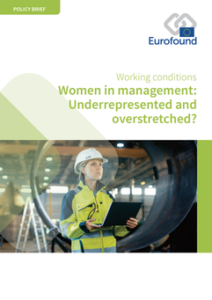Women in management: underrepresented and overstretched?
Despite years of gender equality legislation, men outnumber women in management positions by two to one. While structural barriers continue to impede women’s career advancement, women themselves may be deterred from becoming managers if they perceive that it would have a negative impact on their working and personal lives. What is the experience of women in management roles and how can their underrepresentation in management be addressed? These are the questions this policy brief published by Eurofound seeks to answer by looking at the job quality of managers, both female and male, and the impact a management job has on personal life.
This policy brief looks at the latest data on women in management from the 2015Eurofound’s European Working Conditions Survey (EWCS). It begins by clarifying the meaning of manager and identifies the different roles that exist under this banner. It looks at how management breaks down along gender lines according to type of manager, country, sector, company ownership, and the characteristics of reporting staff. It then turns to job quality, asking whether the working conditions of managers are better than those of non-managers and whether they are similar for women and men. Finally, it probes whether manager status influences men’s and women’s well-being differently and looks the experience of spillovers between work and personal life.
Addressing underrepresentation of women in management
“The obvious answer for addressing gender imbalances in management is to recruit more female managers. However, this is not as straightforward as it may seem. One aspect is stimulating interest in and willingness to take on the challenges of a managerial function. For this to happen, girls and young female workers need role models to guide them. Their interest in developing their professional potential needs to be actively encouraged and supported. Findings from the EWCS show that the public sector and especially the non-profit sector have a higher share of female managers than private companies. This indicates that these sectors devise practices to create opportunities for women to develop their careers. Sharing experiences and knowledge of these measures could help to inspire and stimulate change in companies across the economy.” (p.16)

